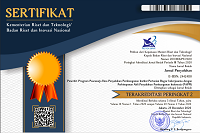Belajar Mandiri melalui System of Intensification (SRI)di Duabelas Subak di Provinsi Bali
Abstract
The traditional irrigation water management system in Bali known as Subak has a great potential for adopting the SRI innovation.In the adoption process, there is also a learning process on the individual members of the subak. The objectives of this researchare (1) to analyze the characteristics of the Subak members, competence of facilitators, competence of Subak caretakers, theperceptions, and attitudes that influence Subak members in Self Directed Learning, and (2) to formulate the strategy of approachand effective extention in improving Self Directed Learning of the Subak members. This research was carried out in sevenregencies in the province of Bali. The total amount of samples in this research is 104 farmers selected through the StratifiedRandom Sampling methods which also included famers that applied SRI innovations. Primary data were collected throughinterviews and direct obserations from September to October 2011. The design of this research is an ex Post Facto and dataanalyzed using Structural Equation Model (SEM). The result of this research shows that: (1) The better the perceptions, attitudestowards SRI, characteristics of members of Subak, competence of facilitators and caretakers of the Subak, the better the level ofSelf Directed Learning of Subak members; and (2) The role of facilitator is very important to helping subak members decidedto accept an agricultural innovation. The discovery of dominant factors which affect the adoption of SRI among Subak memberswill facilitate the caretakers in making a change in Bali.
Keywords: adoption, innovation, SRI, farmers, caretakers
Downloads
Authors who publish with this journal agree to the following terms:
- Authors retain copyright and grant the journal right of first publication with the work simultaneously licensed under a

This work is licensed under a Creative Commons Attribution 4.0 International License that allows others to share the work with an acknowledgement of the work's authorship and initial publication in this journal. - Authors are able to enter into separate, additional contractual arrangements for the non-exclusive distribution of the journal's published version of the work (e.g., post it to an institutional repository or publish it in a book), with an acknowledgement of its initial publication in this journal.
- Authors are permitted and encouraged to post their work online (e.g., in institutional repositories or on their website) prior to and during the submission process, as it can lead to productive exchanges, as well as earlier and greater citation of published work (See The Effect of Open Access).















